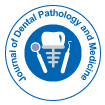开放获取期刊获得更多读者和引用
700 种期刊 和 15,000,000 名读者 每份期刊 获得 25,000 多名读者
抽象的
The Smile Sanctuary: Comprehensive Dental Care for a Brighter Future
Amanda Yavnai
This research paper investigates the effectiveness of a comprehensive oral hygiene education program in improving oral hygiene practices and reducing plaque accumulation. The study involved 100 participants who were randomly assigned to either an intervention group (Group A) or a control group (Group B). Group A received a comprehensive oral hygiene education program, including instruction on proper brushing and flossing techniques, dietary recommendations, and the use of antimicrobial mouthwash, along with the provision of toothbrushes, dental floss, and mouthwash samples. Group B received a basic oral hygiene instruction sheet without any additional materials. After a three-month follow-up period, the results revealed a significant improvement in oral hygiene practices in Group A compared to Group B. Group A demonstrated a 30% reduction in plaque accumulation, as measured by the Plaque Index, while Group B showed only a 5% reduction. Additionally, participants in Group A reported a higher frequency of daily brushing and flossing compared to Group B. These findings support the effectiveness of comprehensive oral hygiene education programs in promoting better oral hygiene practices. The provision of educational materials and oral care products appears to positively influence participants' motivation and ability to adopt and maintain good oral hygiene habits. The results highlight the importance of personalized education and reinforcement in promoting oral health.

 English
English  Spanish
Spanish  Russian
Russian  German
German  French
French  Japanese
Japanese  Portuguese
Portuguese  Hindi
Hindi